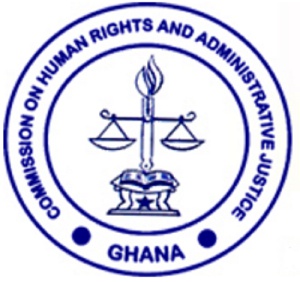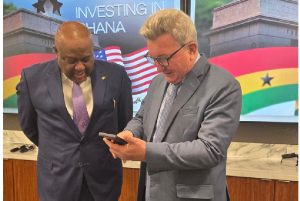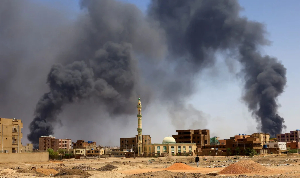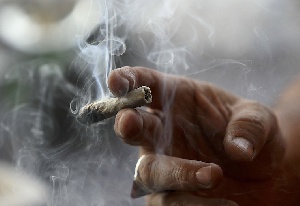Theme: "Pandemics, do they change how we adaress the age and ageing"
The Commission on Human Rights and Administrative Justice (CHRAJ) stands in solidarity with older persons globally in this year's celebration of the International Day of Older Persons.
On 14th December 1990, the United Nations (UN) designated October 1st as the International Day of Older Persons in accordance with UN Resolution 46/9. In 2002, the UN General Assembly adopted the Madrid International Plan of Action (MIPA) on Ageing to respond to the opportunities and challenges of population ageing in the 21st century.
One of the central themes of the MIPA is to ensure the full enjoyment of basic human rights of all persons and the elimination of all forms of discrimination and violence against older persons.
This year, 2020 marks the 30th anniversary of the UN International Day of Older Persons. Unfortunately, this year also witnessed the emergence of COVID-19 with its attendant disproportionate higher risk on older persons across the world requiring targeted policy interventions to meet their special needs.
The 2020 global theme, "Pandemics: Do They Change How We Address Age and Ageing?" is apposite and resonates with the mandate of CHRAJ in the protection and promotion of the human rights of all persons in Ghana including especially older persons.
The theme further highlights the role of the healthcare workforce to the wellbeing of older persons, with special recognition of the role of the nursing profession who are relatively undervalued and in most cases inadequately compensated.
This theme is consistent with goal 3 of The 2030 Agenda for Sustainable Development, which seeks to 'Ensure healthy lives and promote wellbeing for all ages; particularly target 3.8 which aims to achieve universal health coverage including financial risk protection, access to quality essential healthcare services and access to safe effective quality and affordable essential medicines and vaccines for all.
The composition of the world population has changed drastically over the years. Between 1950 and 2010, life expectancy rose from 46 to 68 worldwide. In 2019, there were 703 million persons aged 65 and over globally. According to MIPA, the number of older persons globally is projected to reach 2 billion between 2019 and 2050.
Ghana is a signatory to several international instruments and conventions that seek to protect the rights of older persons such as the 2002 African Union Policy Framework and Plan of Action on Ageing; The 2002 Second World Assembly on Ageing and MIPA on Ageing and the 1982 UN Plan of Action on Ageing.
More importantly, the supreme law of Ghana, the Constitution (1992) enjoins the State to enact appropriate legislation to ensure the protection and promotion of all other basic human rights and freedoms, including the aged; and to provide social assistance to the aged such as will enable them to maintain a decent standard of living?
Accordingly, the government of Ghana developed a Draft National Ageing Policy in 2003 and in 2010 reviewed that existing draft policy into a comprehensive National Ageing Policy (NAP). The overarching goal of the NAP is to achieve the overall social, economic and cultural re-integration of older persons into mainstream society to enable them as far as practicable to participate fully in the national development process.
Additionally, the government, under the NAP, has committed to upholding the rights of older persons through strengthening of legislation to provide full protection for older persons. To this extent, the Government of Ghana in 2012 publicly expressed its intention to formulate a National Ageing Bill to be passed into law.
However, eight (8) years on, the Government is yet to finalize the National Ageing Bill before it could be presented to Parliament for consideration. Some stakeholders have described the delay in passage of the Bill into law as a development that has worsened the vulnerability of the aged in the Country.
The NAP further alludes to evidence that fundamental rights of older persons are often abused in the following manner: “Older people are abused by family and community members. They are accused of being the cause of everything that evades the understanding of family members and women in particular are often falsely accused of witchcraft and violently assaulted and tortured in some cases. Age-based discrimination is pervasive and prevents older people from accessin adequate health care and legal protection.
The recent inhumane killing of Akua Denteh, the 90-year old woman at Kafaba on suspicion of witchcraft gives credence to the above narrative and requires the State to do more by addressing the issue of ageing in Ghana more comprehensively through legislation, policy and institutional reforms to ensure that older persons are protected from abuse or harm.
The NAP further provides a diagnosis of the health challenges of older persons. "Though older persons are fully entitled to have access to preventive and curative care, including rehabilitation and sexual health care, they are often denied them in addition to other essential health care services.
The training of health personnel gives little attention to older people and very few specialist services exist. Currently, there are no special incentives to attract medical and health students to undertake courses in geriatrics and gerontology.
The negative attitudes of some health workers sometimes due to lack of exposure to older persons' health and other needs affect the quality of services provided to older persons. Many older people in Ghana are unable to afford basic treatment.
This problem is expected to be addressed through the National Health Insurance Scheme but many diseases that affect older persons are yet to be included in the scheme still leaving older persons vulnerable."
Ten (10) years after NAP, the State is yet to ensure that the healthcare needs of older persons are comprehensively addressed by the National Health Insurance Scheme (NHIS). For instance, physiotherapy management of Parkinson's disease and dementia, which are more prevalent among older persons (60+ years), and most medications for such conditions are not included in the NHIS drug policy.
The Commission notes that over the years some progress have been made in advancing the rights of older persons in Ghana and recognizing the important role they play, more needs to be done and this day is set aside to draw the State and global attention to the plight of such persons.
As we commemorate this day, CHRAJ wishes to raise awareness on the special health needs of older persons and of the contributions to their own health and to the functioning of the societies in which they live; increase awareness and appreciation of the role of health care workforce in maintaining and improving the health of older persons with special attention to the nursing profession; and also increase understanding of the impact of COVID-19 on older persons, which calls for deliberate healthcare policy and service delivery interventions so as to minimize the effects of this and future pandemics on older persons.
The Commission calls on the government to speed up processes of completing the ongoing stakeholder consultations on the National Ageing Bill and are laid before Parliament.
While we await passage of the National Ageing Bill into law, the Commission further calls on the State to do more to uphold the rights of older persons within the meaning of the NAP, the Constitution and international instruments.
Press Releases of Wednesday, 30 September 2020
Source: CHRAJ













